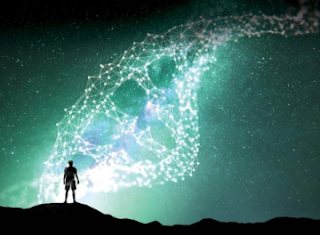Yet, between message and reality,
there is a major disconnect.
Over the last century, important scientific discoveries have dramatically challenged science-based atheism, and three in particular now tell a decidedly more God-friendly story.
First, scientists have discovered that the physical universe had a beginning. This finding, supported by observational astronomy and theoretical physics, contradicts the expectations of scientific atheists, who long portrayed the universe as eternal and self-existent—and, therefore, in no need of an external creator.Evidence for what scientists call the Big Bang has instead confirmed the expectations of traditional theists. Nobel laureate Arno Penzias, who helped make a key discovery supporting the Big Bang theory, has noted the obvious connection between its affirmation of a cosmic beginning and the concept of divine creation. “The best data we have are exactly what I would have predicted, had I nothing to go on but the five books of Moses…[and] the Bible as a whole,” writes Penzias.
Second, discoveries from physics about the structure of the universe reinforce this theistic conclusion. Since the 1960s, physicists have determined that the fundamental physical laws and parameters of our universe are finely tuned, against all odds, to make our universe capable of hosting life. Even slight alterations of many independent factors—such as the strength of gravitational or electromagnetic attraction, or the initial arrangement of matter and energy in the universe—would have rendered life impossible. Scientists have discovered that we live in a kind of “Goldilocks Universe,” or what Australian physicist Luke Barnes calls an extremely “Fortunate Universe.”
Not surprisingly, many physicists have concluded that this improbable fine-tuning points to a cosmic “fine-tuner.” As former Cambridge astrophysicist Sir Fred Hoyle argued, “A common-sense interpretation of the data suggests that a super-intellect has monkeyed with physics” to make life possible.
Third, molecular biology has revealed the presence in living cells of an exquisite world of informational nanotechnology. These include digital code in DNA and RNA—tiny, intricately constructed molecular machines which vastly exceed our own digital hightechnology in their storage and transmission capabilities. And even Richard Dawkins has acknowledged that “the machine code of the genes is uncannily computer-like” — implying, it would seem, the activity of a master programmer at work the origin of life. At the very least, the discoveries of modern biology are not what anyone would have expected from blind materialistic processes.
All this underscores a growing disparity between public perceptions of the message of science and what scientific evidence actually shows. Far from pointing to “blind, pitiless indifference,” the great discoveries of the last century point to the exquisite design of life and the universe and, arguably, to an intelligent creator behind it all." Stephen Myer
First, scientists have discovered that the physical universe had a beginning. This finding, supported by observational astronomy and theoretical physics, contradicts the expectations of scientific atheists, who long portrayed the universe as eternal and self-existent—and, therefore, in no need of an external creator.Evidence for what scientists call the Big Bang has instead confirmed the expectations of traditional theists. Nobel laureate Arno Penzias, who helped make a key discovery supporting the Big Bang theory, has noted the obvious connection between its affirmation of a cosmic beginning and the concept of divine creation. “The best data we have are exactly what I would have predicted, had I nothing to go on but the five books of Moses…[and] the Bible as a whole,” writes Penzias.
Second, discoveries from physics about the structure of the universe reinforce this theistic conclusion. Since the 1960s, physicists have determined that the fundamental physical laws and parameters of our universe are finely tuned, against all odds, to make our universe capable of hosting life. Even slight alterations of many independent factors—such as the strength of gravitational or electromagnetic attraction, or the initial arrangement of matter and energy in the universe—would have rendered life impossible. Scientists have discovered that we live in a kind of “Goldilocks Universe,” or what Australian physicist Luke Barnes calls an extremely “Fortunate Universe.”
Not surprisingly, many physicists have concluded that this improbable fine-tuning points to a cosmic “fine-tuner.” As former Cambridge astrophysicist Sir Fred Hoyle argued, “A common-sense interpretation of the data suggests that a super-intellect has monkeyed with physics” to make life possible.
Third, molecular biology has revealed the presence in living cells of an exquisite world of informational nanotechnology. These include digital code in DNA and RNA—tiny, intricately constructed molecular machines which vastly exceed our own digital hightechnology in their storage and transmission capabilities. And even Richard Dawkins has acknowledged that “the machine code of the genes is uncannily computer-like” — implying, it would seem, the activity of a master programmer at work the origin of life. At the very least, the discoveries of modern biology are not what anyone would have expected from blind materialistic processes.
All this underscores a growing disparity between public perceptions of the message of science and what scientific evidence actually shows. Far from pointing to “blind, pitiless indifference,” the great discoveries of the last century point to the exquisite design of life and the universe and, arguably, to an intelligent creator behind it all." Stephen Myer



.jpg)
